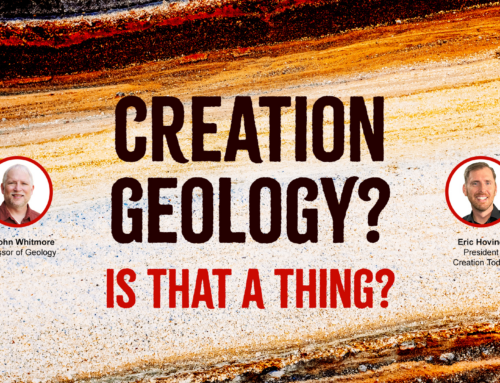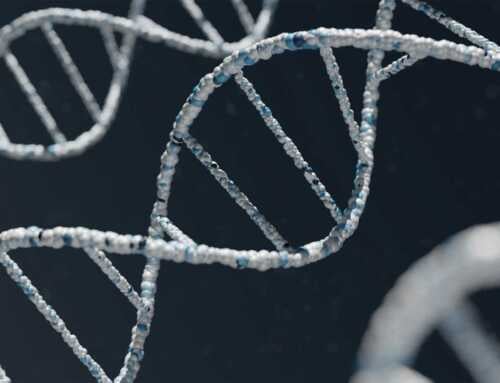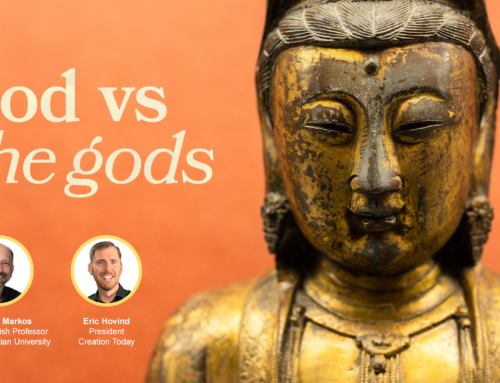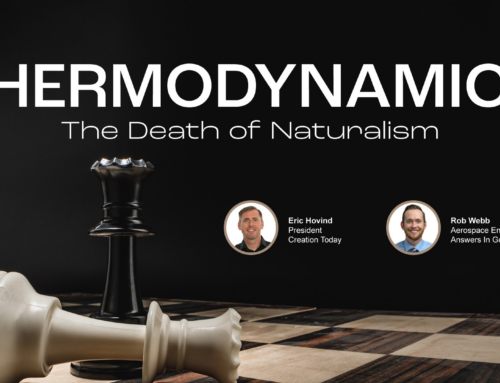Our Creation Today Show titled, “Is Historical Adam a Myth?” with Eric Hovind and Dr. Tim Chaffey focuses on Dr. William Lane Craig’s new book “In Quest of the Historical Adam.” This new book argues Adam and Eve were folklore, or “mytho history,” rather than real human beings recorded in the historical narrative found in Genesis. He further proffers that they could have evolved. His new idea attempts to combine a little bit of Evolution, all of the Old Earth interpretations of modern science, and some other stuff he has made up on the way. It is yet another version of Theistic Evolution which tries to reinterpret Scripture through the lens of man’s current scientific beliefs.
Apologist Curt Blattman wrote a three part series entitled, “Theistic Evolution: The Wrong Compromise.” It offers a brilliant follow-up to the discussion of William Lane Craig’s new book.
Theistic Evolution: The Wrong Compromise — Part I
By Curt Blattman of Bible Apologetics
When one opens up the BioLogos website we are confronted with the following statement: “BioLogos invites the church and the world to see the harmony between science and biblical faith as we present an evolutionary understanding of God’s creation.”[1] Another name for what BioLogos supports is theistic evolution. But just what is theistic evolution?
Though he does not agree with the mindset, Prolific author and Seminary Professor Dr. Wayne Grudem gives a good definition of what those who embrace this hybrid believe: “God created matter, and after that He did not guide or intervene or act directly to cause any empirically detectable change in the natural behavior of matter until all living things had evolved by purely natural processes.”[2] Another definition says that theistic evolution is, “the idea that God, over immense periods of time, used evolutionary processes to create all physical life-forms from a single organism.”[3]
The question before us is, can we, as Christians, hold to both creation and evolution; or in the words of BioLogos, is there a place for an evolutionary understanding of God’s creation?
After examining all the evidence, I hope to show that theistic evolution is the wrong compromise for Christians to m
ake; because, like fire and ice, the Bible and evolution don’t mix. First, let’s examine some reasons in support of the doctrine of theistic evolution.
Many Scientists Believe in Evolution.

Ever since Darwin, there has been a consensus among scientists that evolution is an established fact. This approval started fairly early after Darwin proposed his evolutionary thesis and continues to the present. According to Karl Giberson: “By 1875, evolution had been established as a historical fact to the satisfaction of most scientists as well as educated people who had taken the time to absorb Darwin’s argument.”[4] Francis Collins feels that this is also the case among some Christian scientists. He shares: “Yet theistic evolution is the dominant position of serious biologists who are also serious believers.”[5]
The Catholic Church Endorses Theistic Evolution.
Over the last fifty years, the Catholic Church has moved more and more to supporting the idea of theistic evolution. Francis Collins echoes this idea when he states: “Pope John Paul II in his message to the Pontifical Academy of Sciences in 1996 offered a particularly thoughtful and courageous defense of theistic evolution. The pope stated that ‘new findings lead us toward the recognition of evolution as more than a hypothesis.’”[6]
Some Claim That Genesis 1-3 Was Never Intended to be Taken Literally.
Most people in the theistic evolution camp deny that the genre of Genesis 1-3 is that of historical narrative. Instead, they contend that these chapters are either poetic, figurative, or allegorical in nature and were never meant to be interpreted as historical. As a result of this position, the idea that Adam and Eve were historical figures is an incorrect interpretation of Scripture. Dr. Grudem quotes Francis Collins who believes that Genesis 1-2 is best understood as poetry and allegory thus opening the door to the theistic evolution position. According to Collins: “Population geneticists…conclude that…our species…descended from a common set of founders, approximately 10,000 in number, who lived about 100,000 to 150,000 years ago.”[7] This thought is also expressed as the position of the BioLogos organization according to John M. Otis who says: “Genetic evidence shows that humans descended from a group of several thousand individuals who lived about 150,000 years ago.”[8]
Thus we can see that if Adam and Eve were not historical figures, the idea that humans descended from hominids becomes a distinct possibility. Again, Otis shares the BioLogos position relating to eolutionists’ interpretation of scientific evidence: “The fossil record shows a gradual transition over 5 million years ago from chimpanzee-size creatures to hominids with larger brains who walked on two legs.”[9] Theistic Evolution advocates feel that once we separate Adam and Eve from their traditional historical setting, their case for evolution combined with their interpretations of scientific evidence makes their case indeed compelling.
Some Christians Claim That Since Evolution Is Taught as a Fact, God Must Have Used It.
 At one time or another, most of us have been told that science has proven that evolution is a fact. We are told that we must view the Bible through the lens of science in order to get a correct understanding of what the biblical writer of Genesis intended us to understand about creation. Since many Christians accept that modern science must be true, they are left with the need to fit the “fact” of evolution into their theology. Theistic Evolutionist Karl Giberson uses this idea of “evolution being a scientific fact” to help us see why Christians need to embrace theistic evolution when he says: “The theory of evolution is a vast and complicated network of interlocking explanatory concepts tying together everything from the age of fossil bones to similarities between human and chimp DNA. There is, quite simply, a mountain of evidence from multiple sources supporting evolution.”[10]
At one time or another, most of us have been told that science has proven that evolution is a fact. We are told that we must view the Bible through the lens of science in order to get a correct understanding of what the biblical writer of Genesis intended us to understand about creation. Since many Christians accept that modern science must be true, they are left with the need to fit the “fact” of evolution into their theology. Theistic Evolutionist Karl Giberson uses this idea of “evolution being a scientific fact” to help us see why Christians need to embrace theistic evolution when he says: “The theory of evolution is a vast and complicated network of interlocking explanatory concepts tying together everything from the age of fossil bones to similarities between human and chimp DNA. There is, quite simply, a mountain of evidence from multiple sources supporting evolution.”[10]
Giberson goes on to add: “We must also take note of another major distinction between evolution and creation. The thousands of scientists who work within the broad paradigm of evolution – the geneticists, paleontologists, biogeographers, biologists, biochemists and so on – all agree on the broad outlines of the theory. They all agree that common ancestry is a fact.”[11] Armed with this “factual knowledge” of evolution, the logical conclusion for many Christians is that God must have used it to bring humanity into existence.
Fear of Being Viewed as “Anti-Intellectual” Causes Some to Opt for Theistic Evolution.
This can be a powerful reason many Christians have accepted theistic evolution. The group of people you are with can make a big difference in the belief system to which you adhere. Bert Thompson shares this insightful comment: “The influence of co-workers, friends, or peers also cannot be ruled out. Pressure to conform to the status quo is quite severe, especially in the scientific community.”[12]
Thompson continues along these same lines by quoting Stanley Beck, of the American Lutheran Church: “To call himself reasonably well-educated and informed, a Christian can hardly afford not to believe in evolution. Evolution, including human evolution, is no longer in contention. Evolution has been demonstrated so thoroughly…even produced experimentally, that it has ceased to be a matter of opinion. And to announce that you do not believe in evolution is as irrational as to announce that you do not believe in electricity.”[13]
Sadly, many Christians decide on essential doctrines not by doing their own careful study of the Scriptures but by bowing down to what people in so-called authority positions happen to believe. And when these are scientists, the pressure to conform becomes that much more significant.
In Part II of “Theistic Evolution: The Wrong Compromise,” we will explore some implications if theistic evolution is true.
Author: Apologist Curt Blattman
Bible Apologetics
A graduate of Princeton University, Curt Blattman served as VP of Finance at JP Morgan Chase for 26 years in Manhattan. After retiring, he began a second career as a counselor at the Manhattan Bowery Mission. Receiving his Masters in Christian Apologetics from Biola University in 2018, he began his third career as an apologist. Speaking and ministering through his website, Bible Apologetics.com, Mr. Blattman posts daily devotionals of hope and truth to encourage the Christian and challenge the skeptic on why the Bible should not only be believed, but be read daily. http://bibleapologetics.org
Mr. Blattman’s prolific pen has also authored two truth-revealing books: The Challenge, and Children of the Womb: All are Precious in God’s Sight. Mr. Blattman remains busy speaking on apologetics and lives in Manhattan with his wife, Meiying.
[1] BioLogos website – What We Believe – BioLogos
[2] J. P. Moreland, Stephen C. Meyer, Christopher Shaw, Ann K. Gauger, and Wayne Grudem, Editors, Theistic Evolution: A Scientific, Philosophical, and Theological Critique. (Wheaton, IL: Crossway, 2017). p. 784.
[3] Dean Davis, Theistic Evolution: What Difference Does it Make? Creation Ministries International. https://creation.com/theistic-evolution-what-difference-does-it-make
[4] Karl W. Giberson, Saving Darwin: How to Be a Christian and Believe in Evolution. (New York: HarperOne, 2008). p. 57.
[5] Francis S. Collins, The Language of God: A Scientist Presents Evidence for Belief. (New York: Free Press, 2006). p. 199.
[6] Ibid. p. 202.
[7] J. P. Moreland, Stephen C. Meyer, Christopher Shaw, Ann K. Gauger, and Wayne Grudem, Editors, Theistic Evolution: A Scientific, Philosophical, and Theological Critique. (Wheaton, IL: Crossway, 2017). p. 69.
[8] John M. Otis, Theistic Evolution: A Sinful Compromise. (Burlington, NC: Triumphant Publications Ministries, 2016). p. 116.
[9] Ibid. p. 114.
[10] Karl W. Giberson, Saving Darwin: How to Be a Christian and Believe in Evolution. (New York: HarperOne, 2008). p. 194.
[11] Ibid. p. 204.
[12] Bert Thompson, What’s Wrong with Theistic Evolution? Apologetics Press. 2001.
http://apologeticspress.org/apcontent.aspx?category=9&article=306
[13] Ibid.






